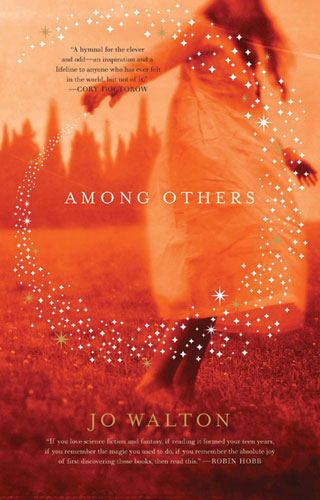
 Morwenna Phelps is a 15-year-old Welsh girl at an English boarding school at the tail end of the 1970s. She reads science fiction and fantasy voraciously, and she has firm opinions on what she's read: "I love Heinlein but he clearly doesn't get fantasy," she tells her diary, and when she finds out that Aslan is supposed to be a allegorical figure of Jesus, it's as if C.S. Lewis has betrayed her personally (although she's totally prepared to read Mere Christianity to learn more about his beliefs). It's not just an intellectual curiosity for Mori: she communicated regularly with the fairies back in Wales--although they weren't quite like the fairies you read about in novels--and practiced magic. In fact, "I saved the world," she reports, "or I think I did."
Morwenna Phelps is a 15-year-old Welsh girl at an English boarding school at the tail end of the 1970s. She reads science fiction and fantasy voraciously, and she has firm opinions on what she's read: "I love Heinlein but he clearly doesn't get fantasy," she tells her diary, and when she finds out that Aslan is supposed to be a allegorical figure of Jesus, it's as if C.S. Lewis has betrayed her personally (although she's totally prepared to read Mere Christianity to learn more about his beliefs). It's not just an intellectual curiosity for Mori: she communicated regularly with the fairies back in Wales--although they weren't quite like the fairies you read about in novels--and practiced magic. In fact, "I saved the world," she reports, "or I think I did."
One of the wonderful things about Among Others is that you're never entirely sure what to make of Mori's self-presentation: Was the accident that maimed her and killed her twin sister really a magical attack by their mother in retaliation for their attempts to thwart her schemes, or just an ordinary, unfortunate car crash? Is she continuing to talk with unworldly beings in the forests, or do she and her mother both suffering from mental illness? Walton doesn't tip the scales in either direction; even Mori concedes that the magic she works looks like nothing more than a chain of coincidences to non-believers. But, inspired by writers like Samuel R. Delany and Ursula K. Le Guin, she's earnestly concerned with the ethics of her spellcasting. Feeling alone at her new school, she wishes for a "karass" (a cohort of like-minded people, a term she gleans from Kurt Vonnegut's Cat's Cradle), then, when she learns about a reading group at the town library, worries about whether her new friends share her love for fantasy only because her spell made them that way.
Whatever you believe about Mori's mental state, however, Among Others is a captivating story about a young woman trying to make sense of her life after devastating tragedy, sifting through both her experiences and her vast reading to make sense of her life. It certainly enhances one's appreciation of the novel to be as passionate about science fiction as she is, but even if names like Roger Zelazny and H. Beam Piper are completely unfamiliar, it doesn't take any great leap of faith to get her enthusiasm and be willing to see her through.--Ron Hogan
Shelf Talker: Among Others has all sorts of crossover possibilities: Is it fantasy or mainstream fiction? Is it for adults or YA readers? Tor invokes a comparison to Jonathan Lethem's The Fortress of Solitude; another excellent reference point is Frank Portman's Andromeda Klein.

